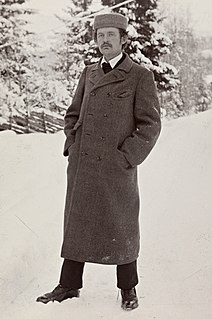Top 104 Springtime Quotes & Sayings - Page 2
Explore popular Springtime quotes.
Last updated on December 4, 2024.
When an almond tree became covered with blossoms in the heart of winter, all the trees around it began to jeer. 'What vanity,' they screamed, 'what insolence! Just think, it believes it can bring spring in this way!' The flowers of the almond tree blushed for shame. 'Forgive me, my sisters,' said the tree. 'I swear I did not want to blossom, but suddenly I felt a warm springtime breeze in my heart.
Oxford, in those days, was still a city of aquatint. In her spacious and quiet streets men walked and spoke as they had done in Newman's day; her autumnal mists, her grey springtime, and the rare glory of her summer days - such as that day - when the chestnut was in flower and the bells rang out high and clear over her gables and cupolas, exhaled the soft airs of centuries of youth. It was this cloistral hush which gave our laughter its resonance, and carried it still, joyously, over the intervening clamour.
It was autumn, the springtime of death. Rain spattered the rotting leaves, and a wild wind wailed. Death was singing in the shower. Death was happy to be alive. The fetus bailed out without a parachute. It landed in the sideline Astroturf, so upsetting the cheerleaders that for the remained of the afternoon their rahs were more like squeaks.
I suddenly recall the arpeggios of laughter lilting across the tender, springtime grass-gay-welling, far-floating, fluent, spontaneous, a bell-like feminine fluting, then suppressed; as though snuffed swiftly and irrevocably beneath the quiet solemnity of the vespered air now vibrant with somber chapel bells.
Nothing endures except change; nothing is constant except death. Every heartbeat wounds us, and life would be an eternal bleeding to death, were it not for literature. It grants us what nature does not: a golden time that doesn't rust, a springtime that never wilts, cloudless happiness and eternal youth. [my translation]
The fields are still ripe for harvesting (cf. Jn 4:35); God continues to give the growth (cf. 1 Cor 3:6). We can and must believe, with the late Pope John Paul II, that God is preparing a new springtime for Christianity (cf. Redemptoris Missio, 86). What is needed above all, at this time in the history of the Church in America, is a renewal of that apostolic zeal which inspires her shepherds actively to seek out the lost, to bind up those who have been wounded, and to bring strength to those who are languishing (cf. Ez 34:16).
Autumn is the Sabbath of the year; the time to think of all the past: nature's calm twilight before the darkness. It does make all men think at times; even the lightest and the worst. The distant days of our springtime, our faded summer, comes over us like a dream. We sit in the evening of our life in tender musings, and all that has been takes shadowy form again, and passes through the thoughts.
Lord of the springtime, Father of flower, field and fruit, smile on us in these earnest days when the work is heavy and the toil wearisome; lift up our hearts, O God, to the things worthwhile-sunshine and night, the dripping rain, the song of the birds, books and music, and the voices of our friends. Lift up our hearts to these this night and grant us Thy peace. Amen.
And you're headed to a place with no bath and no shower. So you can just imagine how crazy it is to get up there, take your diaper off, have a urine-soaked crotch, and all you can do is wet a washcloth and wipe your skin off. You also have to do it on landing and spacewalks, too. It's not a ride that makes you springtime fresh.
A human life has seasons much as the earth has seasons, each time with its own particular beauty and power. And gift. By focusing on springtime and summer, we have turned the natural process of life into a process of loss rather than a process of celebration and appreciation. Life is neither linear nor stagnant. It is movement from mystery to mystery. Just as a year includes autumn and winter, life includes death, not as an opposite but as an integral part of the way life is made.
Can man be so age-stricken that no faintest sunshine of his youth may re visit him once a year? It is impossible. The moss on our time-worn mansion brightens into beauty; and the good old pastor, who once dwelt here, renewed his prime and regained his boyhood in the genial breeze of his ninetieth spring. Alas for the worn and heavy soul, if, whether in youth or age, it has outlived its privilege of springtime sprightliness!
Poetry reveals to us the loveliness of nature, brings back the freshness of youthful feelings, reviews the relish of simple pleasures, keeps unquenched the enthusiasm which warmed the springtime of our being, refines youthful love, strengthens our interest in human mature, by vivid delineations of its tenderest and softest feelings, and through the brightness of its prophetic visions, helps faith to lay hold on the future life.
...a chasm opened in the earth and out of it coal-black horses sprang, drawing a chariot and driven by one who had a look of dark splendor, majestic and beautiful and terrible. He caught her to him and held her close. The next moment she was being borne away from the radiance of earth in springtime to the world of the dead by the king who rules it.
Because God is full of life, I imagine each morning Almighty God says to the sun, "Do it again"; and every evening to the moon and the stars, "Do it again"; and every springtime to the daisies, "Do it again"; and every time a child is born into the world asking for curtain call, that the heart of the God might once more ring out in the heart of the babe.
A soul that is ruined in the bud will frequently return to the springtime of its beginning and its promise-filled childhood, as though it could discover new hopes there and retie the broken threads of life. The shoots grow rapidly and eagerly, but it is only a sham life that will never be a genuine tree.
April is the cruelest month, T.S. Eliot wrote, by which I think he meant (among other things) that springtime makes people crazy. We expect too much, the world burgeons with promises it can't keep, all passion is really a setup, and we're doomed to get our hearts broken yet again. I agree, and would further add: Who cares? Every spring I go out there anyway, around the bend, unconditionally. ... Come the end of the dark days, I am more than joyful. I'm nuts.
I've just been playing the Trout Quintet on the phonograph. Listening to the andantino makes me want to be a trout myself. You can't help rejoicing and laughing, however moved or sad you feel, when you see the springtime clouds in the sky, the budding branches, moved by the wind, in the bright early sunlight. I'm really looking forward to the spring again. In that piece of Schubert's you can positively feel and smell the breeze and hear the birds and the whole of creation shouting for joy.
In the garden there was nothing which was not quite like themselves - nothing which did not understand the wonderfulness of what was happening to them - the immense, tender, terrible, heart-breaking beauty and solemnity of Eggs. If there had been one person in that garden who had not known through all his or her innermost being that if an Egg were taken away or hurt the whole world would whirl round and crash through space and come to an end... there could have been no happiness even in that golden springtime air.
It is a thought as sweet as heaven to know that in the minds of each of us the may by the fence still blooms in an eternal springtime; that the snowdrop has in our hearts a triple birth, and blooms in three separate minds, faultlessly... So that if all the flowers and grasses and hollows and hills of the old house were razed and mutilated - as they are now, I suppose - we keep them intact in three minds, each depending on the other to supply it with the delicate minutiae of remembrance.
Marriages are always moving from one season to another. Sometimes we find ourselves in winter--discouraged, detached, and dissatisfied; other times we experience springtime, with its openness, hope, and anticipation. On still other occasions we bask in the warmth of summer--comfortable, relaxed, enjoying life. And then comes fall with its uncertainty, negligence, and apprehension. The cycle repeats itself many times throughout the life of a marriage, just as the seasons repeat themselves in nature.
Not every sky will be blue and not every day is springtime. So on the spiritual path a person learns to find this kind of happiness without needing nice things to happen on the outside. Rather, you find happiness by being who you really are. This isn't mystical. Young children are happy being who they are. The trick is to regain such a state when you are grown and have seen the light and dark sides of life.
True variety is in that plenitude of real and unexpected elements, in the branch charged with blue flowers thrusting itself, against all expectations, from the springtime hedge which seems already too full, while the purely formal imitation of varietyis but void and uniformity, that is, that which is most opposed to variety.
The diligent reading of Sacred Scripture accompanied by prayer brings about that intimate dialogue in which the person reading hears God who is speaking, and in praying, responds to him with trusting openness of heart. If it is effectively promoted, this practice will bring to the Church-I am convinced of it-a new spiritual springtime.
The Hour-Hand of Life --- Life consists of rare, isolated moments of the greatest significance, and of innumerably many intervals, during which at best the silhouettes of those moments hover about us. Love, springtime, every beautiful melody, mountains, the moon, the sea - all these speak completely to the heart but once, if in fact they ever do get a chance to speak completely. For many men do not have those moments at all, and are themselves intervals and intermissions in the symphony of real life.
Every time I look down on this timeless town Whether blue or gray be her skies. Whether loud be her cheers or soft be her tears, More and more do I realize: I love Paris in the springtime. I love Paris in the fall. I love Paris in the winter when it drizzles, I love Paris in the summer when it sizzles. I love Paris every moment, Every moment of the year. I love Paris, why, oh why do I love Paris? Because my love is near.
I return to the newborn world, and the soft-soil fields, What their first birthing lifted to the shores Of light, and trusted to the wayward winds. First the Earth gave the shimmer of greenery And grasses to deck the hills; then over the meadows The flowering fields are bright with the color of springtime, And for all the trees that shoot into the air.
(Soft petals, yes, but not so barren quite,
Mingled with these, smooth bean and wrinkled pea;)
And go along with you ere you lose sight
Of what you came for and become like me,
Slave to a springtime passion for the earth.
How love burns through the Putting in the Seed
On through the watching for that early birth
When, just as the soil tarnishes with weed,
The sturdy seedling with arched body comes
Shouldering its way and shedding the earth crumbs.
Many animals even now spring out of the soil, Coalescing from the rains and the heat of the sun. Small wonder, then, if more and bigger creatures, Full-formed, arose from the new young earth and sky. The breed, for instance, of the dappled birds Shucked off their eggshells in the springtime, as Crickets in summer will slip their slight cocoons All by themselves, and search for food and life. Earth gave you, then, the first of mortal kinds, For all the fields were soaked with warmth and moisture.
Desert springtime, with flowers popping up all over the place, trees leafing out, streams gushing down from the mountains. Great time of year for hiking, camping, exploring, sleeping under the new moon and the old stars. At dawn and at evening we hear the coyotes howling with excitement—mating season.
The subject matter covered in Carmina stays pretty basic: love, lust, the pleasures of drinking and the heightened moods evoked by springtime. These primitive and persistently relevant themes are nicely camouflaged by the Latin and old German texts, so the listener can actually feign ignorance while listening to virtually X-rated lyrics. (Veni Veni Venias! Come, come come now!)The music itself toggles between huge forces and a single voice, juxtaposing majesty and intimacy with ease.
I remember that Michael Werner told me about a famous collector, and Michael set up an appointment for us to meet. This man looked around the room and at my pictures. Then he said, "Young man, why are you doing these horrible things? Look out the window. There are nice girls out there. It's springtime. Look at how beautiful the world can be. You'll ruin your health by smoking so much and doing such tortured things."
Hark, I hear a robin calling!
List, the wind is from the south!
And the orchard-bloom is falling
Sweet as kisses on the mouth.
In the dreamy vale of beeches
Fair and faint is woven mist,
And the river's orient reaches
Are the palest amethyst.
Every limpid brook is singing
Of the lure of April days;
Every piney glen is ringing
With the maddest roundelays.
Come and let us seek together
Springtime lore of daffodils,
Giving to the golden weather
Greeting on the sun-warm hills.
From the moment of my birth, the angels of anxiety, worry, and death stood at my side, followed me out when I played, followed me in the sun of springtime and in the glories of summer. They stood at my side in the evening when I closed my eyes, and intimidated me with death, hell, and eternal damnation.
Whether we know it or not, we transmit the presence of everyone we have ever known, as though by being in each other's presence we exchange our cells, pass on some of our lifeforce, and then we go on carrying that person in our body, not unlike springtime when certain plants in fields we walk through attach their seeds in the form of small burrs to our socks, our pants, our caps, as if to say, 'Go on, take us with you, carry us to root in another place.' This is how we survive long after we are dead. This is why it is important who we become, because we pass it on.









































